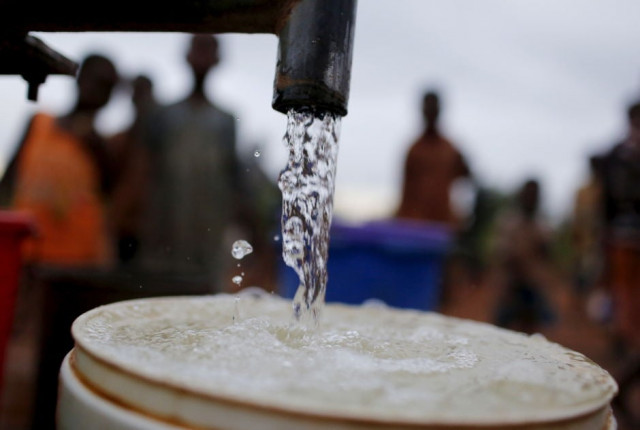Non-functional RO plants create water scarcity
Workers claim the plants frequently develop faults because of substandard quality of machinery

A representational image. PHOTO: REUTERS
According to officials figures, the provincial government set up around 2,222 RO plants worth Rs13 billion in water-starved areas of Tharparkar, Badin, Matiari, Sanghar, Benazirabad, Thatta, Umerkot, Khairpur Mir and other districts of Sindh. The scheme, however, could not see the light of the day as the majority of the plants remain closed for maintenance. Workers say that the government bought machinery of substandard quality because of which the plants have been going out of order since the early days of their installation.
“We haven’t been paid a penny for the last 10 months. We have now locked the RO plant and will not resume our work until our salaries are released,” a contractual employee who was protesting with other colleagues in Bhit Shah of Matiari District said.
The closure of the plants has led to severe water scarcity in various districts where underground water is unfit for human consumption.
The ruling Pakistan Peoples Party (PPP) government claimed to have installed Asia’s biggest RO plant in Mithi, Thar, with a total capacity to filter two million gallons of potable water in a day. PPP co-chairman Asif Ali Zardari inaugurated the plant in 2015, and a huge sum of money was spent on its publicity. However, the fate of the plant hangs in the balance as it hardly runs three to four months in a year.
“This plant has been closed because we don’t have membrane for water treatment,” Jawaharlal Kella, a public health engineer who looks after the RO plants in Thar, told The Express Tribune.
“Reverse osmosis (RO) is a water purification process that uses a partially-permeable membrane to remove ions, unwanted molecules, and larger particles from drinking water, making it fit for drinking,” he said. “Since we have run short of membranes, our plant is closed for many days.”
As against his claim, locals from the area say that the plant has been non-functional for the last three months.
According to government figures, around 600 RO plants of various capacities had been set up in various areas of Thar. Out of the total, 60 per cent are closed per official figures.
“Even those plants which are still functional are not working properly because of which people are not being supplied clean drinking water,” an official in public health who is familiar with the development said.
Initially, several Sindh cabinet members and PPP leaders denied the allegations, saying that the reports of plant closures are untrue. Later, however, Sindh Chief Minister Syed Murad Ali Shah confessed that the RO plants have been closed and called a meeting to discuss the matter in October 2018.
The CM not only ordered a committee to probe the issue, but he also directed the finance department to release Rs336 million for the maintenance of RO plants. Sources privy to the development said that the funds were released to Pak Oasis Company, which has installed almost all the RO plants. But after two to three months, the same situation came to the fore.
“How will the plants work when all are faulty and substandard machinery is used?” an official of the public health engineering department said. “The commission members visited the RO plants in Thar and other areas, expressed serious concerns about the issue, and held the public health department and others responsible for it. They directed the departments concerned to revamp the system, but all went in vain,” he said. Taking notice of the non-functional RO plants, the Chief Secretary Sindh Syed Mumtaz Ali Shah constituted a committee comprising officials of public health, the NED University and Pak Oasis Company last year. The recommendations made by the committee, however, were not made public.
Despite many attempts, the public health engineering department’s secretary was unwilling to speak on this issue. However, his assistant referred the matter to the Pak Oasis Company.
When approached, a senior official of the Pak Oasis Company, who spoke on the condition of anonymity, said that funds were not released to them by the Sindh government, which has created the problem.
“We get a quarterly budget from the provincial government. They have not issued the money for the last two quarters that is why the plants could not undergo maintenance,” he said. “The situation will return to normalcy as soon as the government releases the fund.”
Published in The Express Tribune, May 7th, 2020.



















COMMENTS
Comments are moderated and generally will be posted if they are on-topic and not abusive.
For more information, please see our Comments FAQ